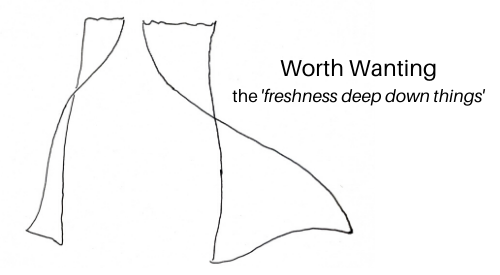
Livingness, the appetite for encounter with others and othernesses, is omnivorous, catholic, eclectic, non-exclusionary, open to the local and familiar, the distant and strange, ready for inspiration from whatever, wherever, whomever. Livingness roams far and wide, interested in all kinds of encounters and encountering, having them, doing it, having more of them and doing it more often, and the same for all.
Making common cause means whetting the appetite for encounter in each of us, the other and ourselves. What’s involved? Not the same as hunger, appetite is rather a stimulus to interest in eating, beyond the minimum requirements for life. For us, livingness supervenes on life. Providing for, in any way and to any extent possible, the basic life requirements of the other–survival, safety, comfort and dignity–is a first step in liberating appetite, theirs and ours, to be as vibrant as it can be.
To be clear then, making common cause with the livingness of another always includes promoting the mundane well-being of the other as individual and in community. Encounters can occur even in conditions of hardship and threat, thankfully, but making common cause involves long term and general as well as immediate and specific solicitude for the situation of an other so as to reduce the distractions of life concerns and so release the other to listen to freshness inviting it to encounter.
We show solicitude directly of course when we’re in direct contact with a definite person. How, however, do we exercise our livingness and make common cause with indefinite others who are at a distance? Others and othernesses are more abstract to us when we can’t see them, or name them, or count or locate them, or clearly classify them. Our appetitive livingness reaches out to them but how do we encounter such others and othernesses, how do we make common cause with their livingness?
The answer is that we rely on institutions we have some voice in or influence on and which have their own livingnesses, to make common cause with those more abstract others on our behalf. We all belong to a variety of institutions dealing with issues of provision and distribution, redress and reconciliation, rules and rights, training and acculturation, and so on, in which and through which we seek to make common cause, albeit indirectly, with the livingness of those indefinite others we address as you.
And institutions have voice in and influence on other institutions, peers or hierarchically above or below, so that by a chain, almost a bucket brigade, of well-wishing, we have means to make common cause with the most distant and disparatend our livingness, our appetite for encounters with all kinds of others in all kinds of places, near and far, past and present, is stimulated, slaked and restirred.
[An institution, like an organization or tradition, is a conceptual construct and as such only able to encounter indirectly through the encounters of those for whom its presence is compelling, its livingness evident in its adjustments of mission, policy, ethos, decision-making and so on as a result of the cumulative encounters of individuals or small groups of members, agents, clients, and other interested parties with one another.]
For freshness, every livingness matters. No livingness is known abstractly, but rather is a perpetual and concrete presence to it. Freshness shares this perspective with us in our encounters. The common cause freshness makes with us, and the livingness of all who are others to us, includes the concern of freshness for the basic requirements of life for individuals and communities. This is implicit in the ethos of freshness: friendship, hospitality and exploration.
Since freshness does not intervene directly in the mundane but only through our encounters, its well-wishing is effective only through us, as we, in turn, encounter others, individuals and institutions, directly and indirectly.
There is, then, a generous and bold impulse in livingness towards not just the new but the good, including particularly what is good for the livingness of any and all of us. What that good might be and how to do it is, of course, practical and political and where complexity comes in, but the basic principle is founded in encountering.
Freshness loves all livingness. In so far as the complex of institutions which constitute a culture or a society or a civilization are open to livingness, freshness consistently invites each and all to encounter, and offers the consequent gifts of livingness which refresh, renew and revive it.
As we consider the crises of today, social, political, environmental, we realize that all things mundane, individuals as well as kinships, neighborhoods, organizations, institutions, traditions, are fragile. They may fail, they fall apart, they may go extinct. History is replete with examples of worst-case scenarios. What we can do to make common cause with the livingness of all others, let us do. Whatever then befalls, we have the encouragement and consolation that none of the encounters we have ventured in our effort are ever lost, but each, incorporated in freshness, has its own legacy, and a fresh future forever.
